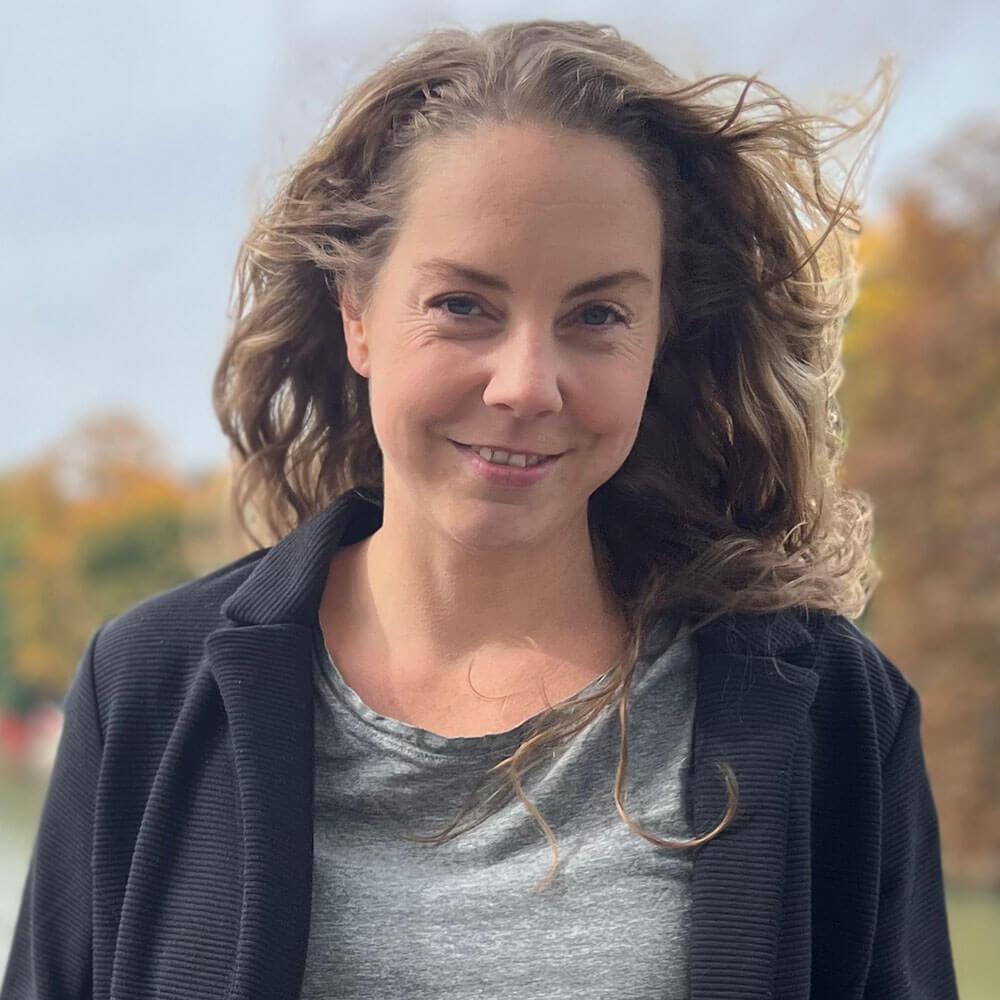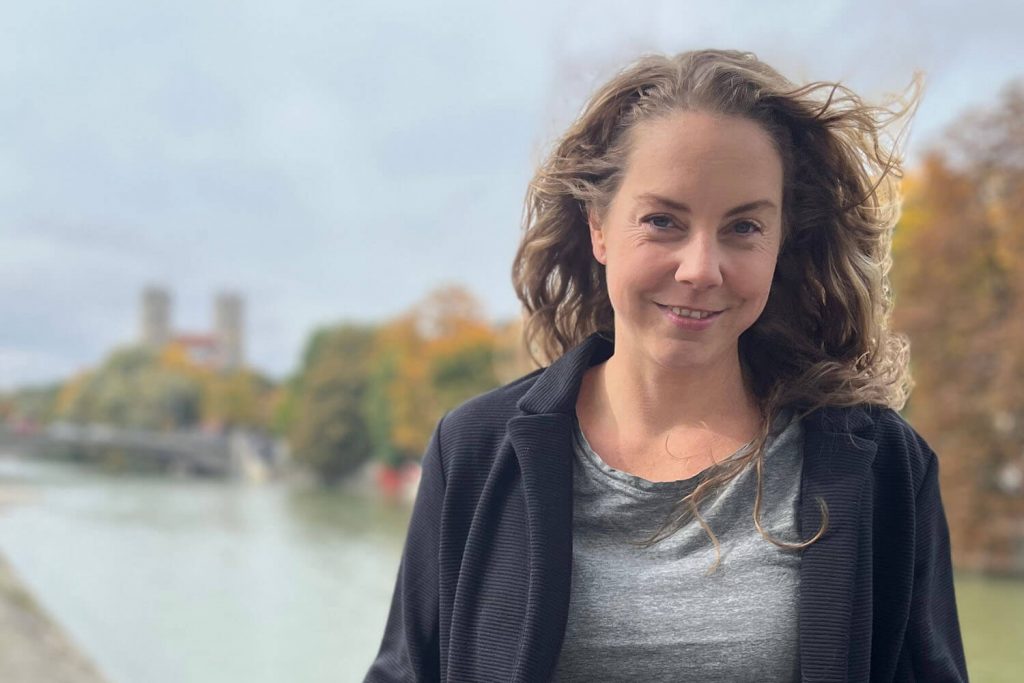Kathrin Zeitler (she/her)
It's still the same homogeneous group that calls the shots in the culture industry, Kathrin Zeitler says. With alma, she is campaigning for a renewal of the cultural sector. But the topic of diversity is also a concern for her in her private life.

I’m Kathrin Zeitler, 41 years old, mother, partner, friend, feminist, culture enthusiast, networker and convinced optimist from Munich. I work four days a week as a consultant for digital communication and transformation at the Munich-based digital agency Ray Sono, where I lead a team of female consultants. But I actually grew up in the cultural industry and was responsible for digital communication in the music sector for many years – most recently at the Bavarian State Opera. Based on this passion, I continue to consult cultural institutions on a freelance basis and have a teaching assignment for “Digital Communication in the Music and Entertainment Industry” at the Munich University of Music. On a voluntary basis, I am also one of seven co-founders of the network “alma – Alliance for Leaders in Music and Arts”, which is committed to future issues (such as female leadership, digitalization, sustainability) in the cultural sector. And above all, I am an enthusiastic mother of two daughters (9 and 17 years old) and very happily married to the father of my second daughter. My big daughter is growing up in a change model, so she lives half with me and half with her father, to whom I am still very close as friends. In my private life, I enjoy the satisfaction that comes with equal opportunities, regardless of gender, in a benevolent and fair way – which, unfortunately, I don’t always manage to do in a professional and social context.
I am becoming more and more convinced of the idea of an unconditional basic income. For me, the breakthrough in my working life was reducing my working hours to 80 percent. Actually, I never wanted to reduce so as not to end up in the typical part-time trap. But last year, by chance, I gave it a try. Of course, it means financial losses. But the freedom, motivation and energy I gain from this time are priceless to me. Suddenly I have inspiration and space for ideas and exchange, and the opportunity and time to implement them. This gives me a sense of freedom and self-efficacy and in turn strengthens my motivation and joy – both privately and professionally. I am aware that this opportunity is a great luxury that not everyone can afford. An unconditional basic income would ensure people the basis for a carefree existence, regardless of their education, career choice, physical constitution, gender or family obligations. And with fewer worries and more time, people would be enabled to develop, to act, to live. And that sounds very desirable to me for all of us and our society.
Another thing on my wishlist is the adjustment of some laws that are dangerously outdated in our time and contribute to great injustices in our society: the criminalization of abortions in paragraph 218, the splitting of marriages, which should give way to fairer tax laws for families, and a rethinking of the “partner months” in the parental allowance, because in my opinion they counteract equal parenthood.
For me, diversity means equal opportunities. And I understand the basis for equal opportunities to be unconditional openness to other perspectives and constant learning in order to overcome discrimination. We should all clearly name injustices and discrimination that we have experienced ourselves and loudly demand that they be overcome – even if that is difficult. The usual forces of persistence are quickly formed and not infrequently violent and relentless. But it is equally important that we become aware of our own privileges and also use our voices for the visibility of people who do not have the same privileges as we do. However, this only works if I move out of my own comfort zone and expose my blind spots. Of course, this can be very painful when it shows how limited and narrow-minded one’s worldview is. But in the end, every new perspective is an enrichment and makes my worldview more colorful. I therefore hope to always be open to new experiences throughout my life. I want to stay in dialogue with people who have had different experiences than I have and think differently than I do – and learn from them.
“alma – Alliance of Leaders in Music and Arts” is a new network for pioneering women (of any gender) who want to lead the cultural and creative sectors into a reshaped future. Through new methods of collaboration, constructive interdisciplinary exchange and the targeted sharing of knowledge, alma sees itself as a breeding ground for true renewal and contributes to a sustainable cultural change in the sector.
We advocate for female leadership, diversity, digital transformation and sustainability – all topics in which the cultural sector is not only lagging years behind, but is also sometimes negligent in closing its eyes to new insights and established standards. Not to mention the fact that the industry tends toward exploitation and that working conditions and hours are not only family-unfriendly, but also hazardous to health. Often, decision-makers’ desire to raise their profile is carried out on the backs of their employees. At the expense of people who have consciously decided to burn for “a good cause” and their passion in a poorly paid profession – and unfortunately often burn out in the process. This is where alma comes in: We want to connect these passionate people, encourage them and provide a space for their visions and ideas to make the cultural sector more humane, healthier, modern and sustainable. And give them a voice. This happens, for example, through knowledge transfer of “future skills” in online events, digital discussion rounds on current problems of the industry, and last but not least the empowerment that comes with the exchange with like-minded people. Our conviction: We are not alone, there are many of us who want to change something – and we are now tackling this together.
I was personally motivated by 14 exciting, fascinating, but also sometimes painful years in the cultural sector. I became a mother during my studies and therefore started my professional life with a small child. Always working at least full time so as not to miss out on anything and to have the same creative opportunities as my colleagues, I nevertheless quickly realized what the glass ceiling meant: I had to fight very hard for opportunities for further development and advancement, if at all, and I was repeatedly confronted with cemented prejudices against working mothers that shook me.
It’s still the same homogeneous group that calls the shots. As many women as there are in the lower levels of the system, you won’t find them in the upper levels of management. The same goes for people with a migration background or disability, people of color, and non-academics. And although many queer people work in culture: Outings are still far from being a matter of course here, too. This all needs to change urgently. The cultural sector needs new mindsets, new role models and new working conditions.
Tip number 1: Please join “alma – Alliance of Leaders in Music and Arts” and share your knowledge, experience and vision with us!
And speaking without advertising: Dare to think outside the box. Don’t hide in the industry, but stay curious and thirsty for knowledge, find out what’s happening outside the cultural bubble and network with leaders from the free market. And: never stop learning. Especially as a leader, in addition to professional competence, it is important to be open to new management and leadership methods, and to continue learning and developing. There is always too little time for this, but it is rarely wasted.
As an enthusiastic person, I find it hard to drop ideas just because I don’t have enough time for them or because they might be exhausting, challenging or lengthy. I always have to discipline myself not to do too much. Because: too many projects also means less and less time for family and friends. However, my children are now so big and independent that the care work is becoming much less, and my partner takes care of a lot of things for me, especially during busy times, which I really appreciate. And it makes it possible for me to contribute to such great projects as “alma” in addition to my permanent position and my freelance work. Thanks for that. 🙂

